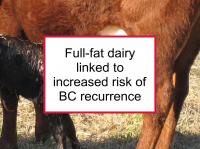Numerous studies have tried to determine the effects of dairy food on breast cancer risk, but the results have been contradictory. This appears to be because some dairy products, such as milk and yogurt, have both beneficial and harmful components, and also because there are variations in how milk cows are treated.
Milk components vitamin D, stearate, lactaptin, conjugated linoleic acid (CLA), and bovine lactoferrin have been found to induce programmed breast cancer cell death or reduce mammary tumor size and incidence in mouse models of breast cancer. In fact, milk has been reported to be somewhat protective against breast cancer when consumed in infancy and childhood.
However, a link between dairy consumption and breast cancer is plausible. Much of the milk we drink today is produced from pregnant cows (in which estrogen and progesterone levels are markedly elevated). U.S. cows are given antibiotics and growth hormones such as zeranol (Ralgro), a non-steroidal substance with estrogenic activity. High intake of animal fats has been linked in several studies to increased breast density, a risk factor for breast cancer and recurrence. Now a new study has reported that breast cancer patients who regularly consume high-fat dairy products appear to have a higher risk of relapse than those who do not.
Latest research finds link between full-fat dairy and recurrence
The study referenced at the beginning of this news story was designed to investigate the associations between dairy food consumption and breast cancer recurrence and mortality. The study included 1,893 women enrolled in the Life After Cancer Epidemiology study. Study participants, who were diagnosed with early stage invasive breast cancer between 1997 and 2000, completed a validated food frequency questionnaire after diagnosis. The women were followed for a median of 11.8 years.
A total of 349 of the women experienced a recurrence and 372 died during follow-up; 189 died from breast cancer. Overall dairy intake was not found to be associated with breast cancer-specific outcomes, although it was linked to increased overall mortality. When the results were analyzed by comparing low-fat and high-fat (full-fat) dairy, low-fat dairy intake was not found to be associated with breast cancer relapse or survival.
On the other hand, women consuming at least half a serving of high-fat dairy per day were found to have somewhat higher breast cancer mortality than those who consumed less. Women who consumed at least one serving of high-fat dairy per day were found to have 1.5 times the risk of those consuming less than half a serving. However, these results did not reach statistical significance. The authors also observed higher all-cause mortality and non-breast cancer mortality among women consuming at least one high-fat dairy serving per day (results which were significant). The higher risk appeared consistent across different types of high-fat dairy products (milk was as harmful as ice cream). The authors conclude that intake of high-fat dairy (but not low-fat dairy) is related to a higher risk of mortality after breast cancer diagnosis.
